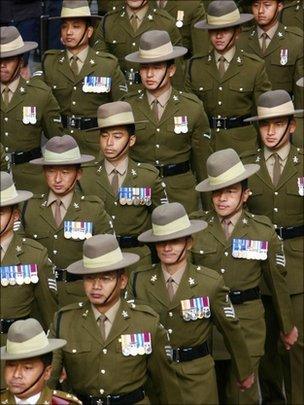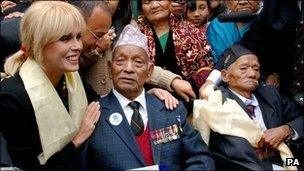Gurkha cuts disproportionate, says ex-Army chief
- Published

The Gurkhas have won new rights to settle in the UK in recent years
The Gurkhas are being hit by defence cuts because of their success in boosting their pay and conditions, a former Army chief has said.
Sir Mike Jackson, former head of the Defence Force, said the Gurkhas were being disproportionately affected.
About 150 Gurkha soldiers are due to leave the Army as a result of compulsory job losses.
The Ministry of Defence said Gurkha numbers had grown and the cuts would reduce the brigade to its proper size.
Defence Secretary Liam Fox said the overall cuts were part of an effort to deal with a £38bn black hole in the defence budget.
Changes to the terms of service has placed Gurkhas on the same footing as the rest of the Army.
In 2007, rules were changed to give Gurkhas who retired after 1997 equal pension rights with other UK service personnel, while the length of service went from 15 to 22 years.
Two years later, all Gurkhas who retired before 1997 with at least four years' service won the right to settle in the UK.
The change came amid a high-profile campaign by actress Joanna Lumley.
Sir Mike told the BBC: "There's a very clear reason for the apparent disproportionate numbers of Gurkhas.
"As a result of a very recent campaign, Gurkha pay, conditions and pensions were put onto the same basis as the British armed forces as a whole."
"I'm afraid the advantage they gained as a result of that successful campaign does mean that under these circumstances sadly there is an apparent disproportionate burden on the Gurkhas themselves."
Decisions 'not easy'
The Gurkhas, based at Shorncliffe in Kent, have fought for Britain all over the world for more than half a century.
The move means further reductions for numbers, which have fallen from a World War II peak of 112,000 men to about 3,500 today.
The MoD said that, because nearly all Gurkhas chose to serve for a longer period, the brigade had grown over time and now needed to be reduced to its proper size.
"Reducing numbers through redundancy is essential if we are to have smaller Armed Forces that deliver the best possible operational capability," said an MoD spokesman.
"We need to structure our forces to ensure that they are sufficiently flexible and adaptable to meet the demands of an uncertain future.

Joanna Lumley led a campaign to improve rights for Gurkhas
"The decisions are not easy, but they will help to defend the UK so that we are best prepared to meet the challenges of the 21st century."
Peter Carroll, of the Gurkha Justice Campaign, described cutting back any part of the armed forces as "dreadfully short-sighted".
"It is particularly unfair that such a large number of Gurkhas are going against their own wishes," he said.
"These are people who, as individuals, have given many years of loyal service to the UK - it risks undermining the 200-year history between Britain and Nepal."
The Ministry of Defence hopes some Gurkhas facing the axe can transfer to other infantry regiments which are below full strength.
Across the British Army, 870 soldiers volunteered for redundancy, but only 660 were accepted.
Of the 260 personnel who will be made compulsorily redundant, more than half will be Gurkhas.
Following the partition of India in 1947, an agreement between Nepal, India and Britain meant four Gurkha regiments from the Indian army were transferred to the British Army, eventually becoming the Gurkha Brigade.
- Published1 September 2011
- Published4 April 2011
- Published27 July 2010